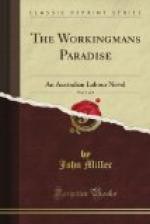“Well, no. Only you must recollect, Stratton, that if she’s been in your place pretty often, most of the people she meets here must have given her a wrinkle or two.”
“You’re always in opposition, Geisner,” declared Mrs. Stratton. “I never heard you agree with anybody else’s statement yet. Nellie is wonderful. You can’t shake our faith in that. There is but one Womanity and Nellie is its prophet.”
“It’s all right about her getting wrinkles here, Geisner,” contributed Ford, “for of course she has. It was what made her, Mrs. Stratton getting hold of her. But at the same time she is extraordinary. When she’s been stirred up I’ve beard her tackle the best of the men who come here and down them. On their own ground too. I don’t see how on earth she has managed to do it in the time. She’s only twenty now.”
“I’ll tell you, if you’ll light the little gas stove for me, Ford, and put the kettle on,” said Mrs. Stratton, drawing her cloak more tightly round her shoulders. “I know some of you men don’t believe it, but it is the truth nevertheless that Feeling is higher than Reason. Isn’t it chilly? You see, after all, you can only reason as to why you feel. Well, Nellie feels. She is an artist. She has got a soul.”
“What do you call an artist?” queried Geisner, partly for the sake of the argument, partly to see the little woman flare up.
“An artist is one who feels—that’s all. Some people can fashion an image in wood or stone, or clay, or paint, or ink, and then they imagine that they are the only artists, when in reality three-quarters of them aren’t artists at all but the most miserable mimics and imitators— highly trained monkeys, you know. Nellie is an artist. She can understand dumb animals and hear music in the wind and the waves, and all sorts of things. And to her the world is one living thing, and she can enjoy its joys and worry over its sorrows, and she understands more than most why people act as they do because she feels enough to put herself in their place. She is such an artist that she not only feels herself but impels those she meets to feel. Besides, she has a freshness that is rare nowadays. I’m very fond of Nellie.”
“Evidently,” said Geisner; “I’ve got quite interested. Is she dressmaking still?”
“Yes; I wanted her to come and live with us but she wouldn’t. Then Harry got her a better situation in one of the government departments. You know how those things are fixed. But she wouldn’t have it. You see she is trying to get the girls into unions.”
“Then she is in the movement?” asked Geisner, looking up quickly.
Mrs. Stratton lifted her eye-brows. “In the movement! Why, haven’t you understood? My dear Geisner, here we’ve been talking for fifteen minutes and—there’s Nellie’s ring. Harry, go and open the door while I pour the coffee.”
The opera cloak dropped from her bare shoulders as she rose from the stool. She had fine shoulders, and altogether was of fashionable appearance, excepting that there was about her the impalpable, but none the less pronounced, air of the woman who associates with men as a comrade. As she crossed the room to the verandah she stopped beside the gloomy young man, who had said nothing. He looked up at her affectionately.




